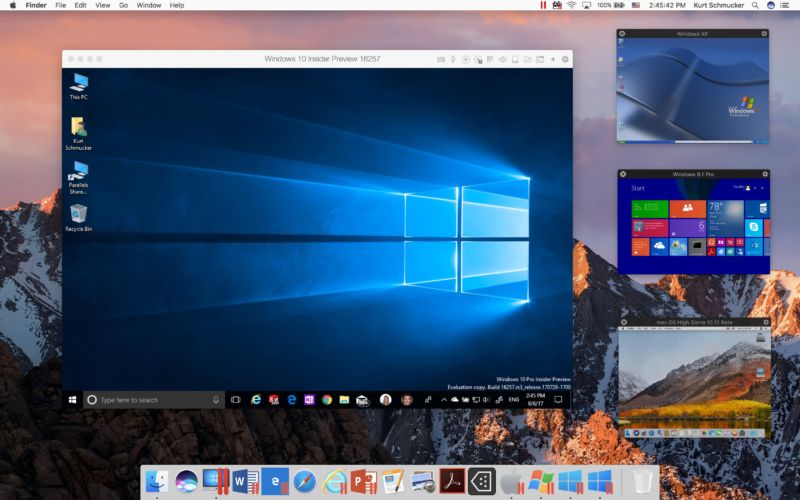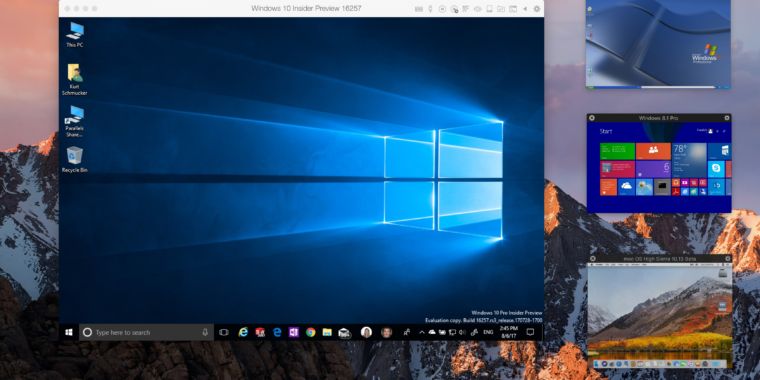
/ OK, technically this set apart no longer have confidence even been that you just would have faith in at the time of this preliminary article, but here is Win10, Win8, Windows XP, and Mac OS X (High Sierra) all collectively. Thanks Parallels.
Parallels
Ten years previously around this very time—April thru June 2008—our dauntless Microsoft guru Peter Vivid evidently had an identity disaster. Would possibly this lifelong PC user if truth be told were pushed to the brink? Became once he concerned with a switch to… Mac OS?!? Whereas our workers with any luck enjoys a less anxious Memorial Day this year, at some level of the weekend we’re resurfacing this three portion series that doubles as an existential working machine gain 22 situation circa 2008. Share one ran on April 21, 2008, and it appears to be like unedited under.
A pair of Gartner analysts have confidence neutral nowadays claimed that Windows is « collapsing »—that it be too large, too sprawling, and too ragged to enable rapid building and tense recent facets. Even supposing organizations worship Gartner rely on trolling to drum up industry, I deem this time they would possibly well well be onto one thing. « Collapsing » is over-dramatic—behind decline is a extra likely result—but the essence of what they’re announcing—and why they’re announcing it—rings right.
Windows is loss of life, Windows applications suck, and Microsoft is too blinkered to repair any of it—that’s the argument. The reality is that Windows is hampered by 25-year ragged have confidence choices. These choices imply that it be clunky to exercise and absolutely imperfect to write applications for. The applications that people originate write are practically universally abominable. They’re grisly, they’re inconsistent, they’re disorganized; there isn’t any longer any finesse, no care lavished on them. Microsoft—absolutely the firm with the finest hobby in making Windows and Windows applications exude quality—is, if truth be told, one in every of the worst perpetrators.
The sad remark about that is that there would possibly well be a firm that’s no longer easiest faced identical considerations but in addition tackled them. Apple in the mid-Nineties used to be faced with an working machine that used to be going nowhere, and wanted to carry radical action to manual clear of going out of industry. And so as that is what Apple did. Apple’s feature in the industry has the least bit times been extra prominent than mere sales figures would imply, but for the time being even the sales numbers are on the up. There are lessons to be learned from the firm in Cupertino; I easiest hope they’re going to be.

/ Windows 98 would possibly well perhaps well divulge your favorites from Internet Explorer—integrating its OS and its browser bought Microsoft into some regulatory hassle, as you would elevate.
Andrew Cunningham
A little bit background
I’ve never been a Mac user. I’ve used Macs most frequently, for certain, but never owned one myself. As with many Brits d’un certain âge in college I used to be brought up on a food regimen of Acorn Archimedes and RISC OS. RISC OS brought with it many important facets: it had a spatial file browser completed effectively, its menu bar used to be optimally positioned, it used bundles for applications, and it had a taskbar/dock earlier than anybody else did. The Archimedes used to be, nevertheless, a footnote in the ancient previous of computing, and the finest computers I’ve ever owned were PCs.
I purchased my first PC in 1997. It used to be a Dell Pentium II with Windows ninety five. I purchased it ensuing from I used to be drawn to computers and I needed to sight ideas to program them, so I picked up a pupil version of Visible Studio ninety seven and duly learned C++. At that time, Windows used to be if truth be told the finest sport in metropolis; Macs were ever so costly and, as all people is aware of, there used to be no utility on hand for them.
Microsoft used to be comely obedient to me at the time. The Windows OS used to be hasty and reasonably staunch. We didn’t need to peril about allocating memory to applications or rebuilding our desktops, and even supposing the preemptive multitasking and guarded memory weren’t supreme, the machine used to be obviously extra staunch than any Mac.
I purchased cheap pupil copies of Visible Studio 6 and Situation of labor ninety seven. I purchased the Windows 98 upgrade on the day of its delivery, wowed by its swish recent sight (gradients in the title bars!). Microsoft sent me copies of an inspiring recent working machine called « Windows NT 5 Beta 2 » which I eagerly keep in and ran as my most well-known OS till it expired; Microsoft even sent me a reproduction of Windows 2000 for my hassle. That OS used to be bullet-proof; it used to be rapidly, it ran the total applications I needed, it supported my utility—what extra would possibly well perhaps well any individual keep a question to for?
I started working in behind 1999 as a utility developer, writing all forms of programs in Java, Visible Basic 6, C++, SQL Server, and whatever else I had to exercise. All over again, I felt effectively-treated by Microsoft. MSDN Library used to be a favorable developer helpful resource; Microsoft used to be delivery about what it used to be doing, giving out betas of Windows XP (or Whistler, as it then used to be) to 1 and all, and it felt worship the firm knew what it used to be doing. Redmond had a roadmap of Whistler and Blackcomb; it had a belief.
This used to be pleasing to any individual who programmed for a living. Builders felt valued, worship the firm cared about them. I revel in programming, and I revel in writing utility. I did then; I originate now. So for me, that is if truth be told a key part of what a platform has to present.
-
Andrew Cunningham is no longer if truth be told the finest one who’s been dabbling in OS 9 inner latest years.
Andrew Cunningham -
Andrew Cunningham -
The Ars homepage in Classilla (seen via MacOS 9.2). Here is our worst redesign yet!
Andrew Cunningham
A fast ancient previous of Macs
The Mac at this time used to be aloof struggling with its frail OS and its underpowered hardware, and your total platform felt stagnant.
Cutting-edge, circa 2000 Apple 
In 2001, Apple correct about managed to gain OS X out the door—dragging Mac utility kicking and screaming into the twenty first century—but had so little self belief in the remark that it aloof made the computers default to Mac OS 9. Even Mac proponents regarded OS X as little better than a beta. But it absolutely used to be the initiating of a large commerce in the fortunes of the Mac platform. Even supposing OS X used to be plain and buggy, it also hinted at being one thing extra; a platform for the future. The infrastructure used to be sound, and Quartz used to be downright as a lot as the moment. Its Cocoa API and Purpose-C were an inspiring building platform offering intelligent recent facets worship « Map Services. »
Share of this used to be by accident. If Apple’s Copland project had come to fruition, it doubtlessly set apart no longer have confidence took jam the least bit. Apple’s intent used to be to update the aging OS piecemeal, alongside with protected memory and preemptive multitasking, and, part by part, update the core OS libraries to greater assist these as a lot as the moment facets. Sooner or later this would change into sufficiently developed that the « Gershwin » OS would be « fully as a lot as the moment, » whatever this intended (even Apple wasn’t obvious).
Characteristic mosey and mismanagement resulted in the cancellation of Copland. As an different of developing a recent OS from the existing one, Apple decided to rating a latest OS and exercise that because the premise for its future working machine. This resulted in the acquisition of NeXT, and NeXTstep went on to gain the premise of Mac OS X.

Admittedly, I’d’ve fortunately performed an Apple/NeXT Q*bert knock-off.
Aurich Lawson
NeXTstep used to be comely radical in its day; it be ensuing from NeXTstep that OS X makes exercise of Purpose-C and has an Purpose-C library. Repeat Postscript in NeXTstep grew to vary into Repeat PDF in OS X. NeXTstep had the identical mixture of Mach and BSD code that grew to vary into MacOS X’s Darwin kernel. Clearly, this aloof left Apple with moderately a few labor to originate; NeXTstep would possibly well perhaps well no longer dawdle Mac apps, which used to be obviously a large remark for a MacOS successor, so Apple devised the « Basic » virtual machine to assemble assist for legacy applications. Recent applications would exercise the recent Cocoa or Carbon APIs.
This form—compelled on it ensuing from screwing up the Copland project—keep Apple in a worthy situation. The recent OS used to be freed from most of the legacy constraints that the Copland manner would have confidence prompted; the clumsy ragged APIs were restricted to the Basic atmosphere, they most frequently didn’t gain an element of the as a lot as the moment OS core. Even supposing the recent APIs weren’t fully recent—the Obj-C Cocoa API used to be in accordance with the NeXTstep API, and Carbon used to be equivalent to the ragged MacOS API—they were cleaned up, allowing infamous choices of the previous to be mounted.


Commentaires récents